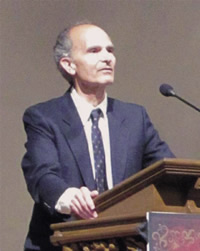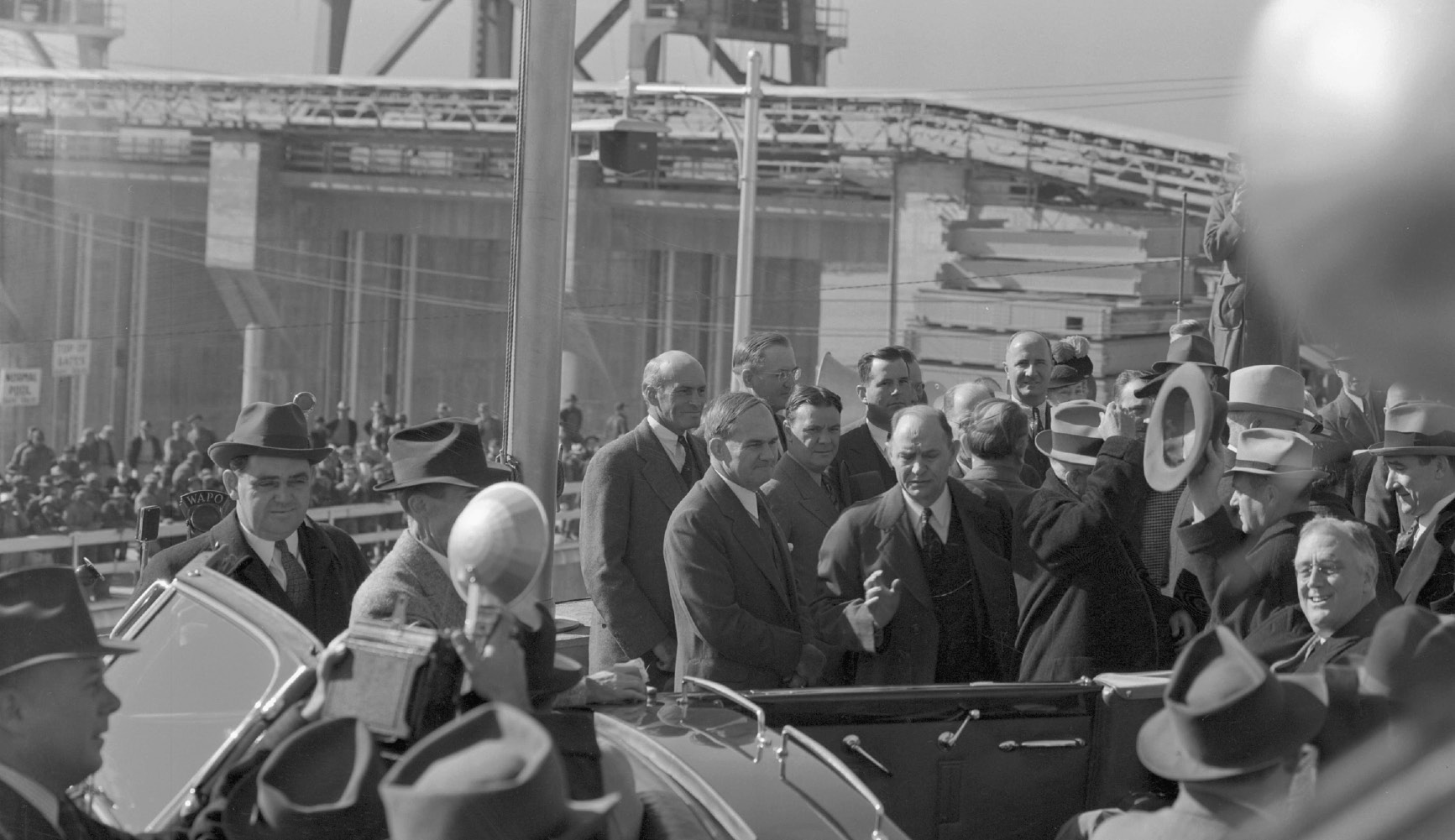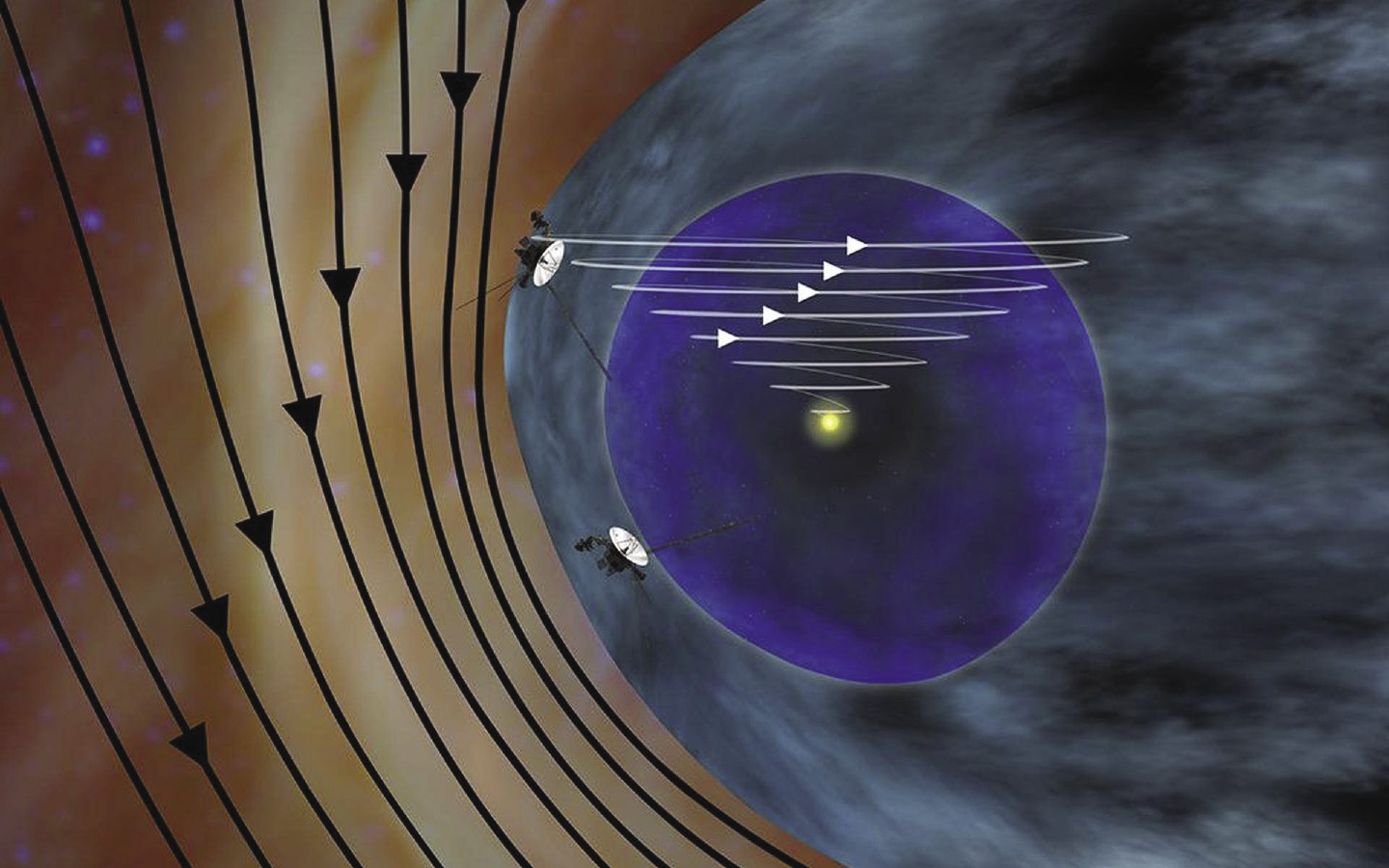 |
NEW WEBSITE: FORUM FOR A NEW PARADIGM
The Science of Creativity
by Phil Rubinstein
June 2013
 EIRNS/Daniel Platt
“Human beings never have to fail,” said Rubinstein. “If we fail, it’s because we didn’t live up to being human beings.” |
Phil Rubinstein, a veteran leader of the LaRouche movement, gave this speech at the June 29 Schiller Institute Conference in San Francisco.
I want to hone in on a few points, taking off from what Megan Beets and others have said.
Lyndon LaRouche was very clear this morning that we need Glass-Steagall, but we need Glass-Steagall understood in a deeper and more profound way than “Glass-Steagall.” It was interesting to find out that Mr. [Henry B.] Steagall also put forth a bill in 1941 on parity, but Carter Glass was well-known as actually a sort of friend of the bankers. Steagall was, I think, more of a Roosevelt Democrat. So, Glass-Steagall only tells you a little bit.
And Lyn has made the point that essentially, except for the many efforts that he’s made, and a few efforts from a few other people, nobody understands really what an American credit system is. And that Glass-Steagall fundamentally doesn’t work, doesn’t do what we want it to do, unless we have the deeper understanding of what it means. He discussed why all U.S.A. patriots should hate all monetarist systems, especially our own. And he talked about the disaster of the continued belief in a monetarist system.
Now some of these things I would like to try to sharpen as much as I can, because I think sometimes it takes a while for the idea to sink in. In some ways, sad to say, I think until somebody squeaks a little bit, you’re not sure that you’ve really hit the idea.
What Is Fascism?
 |
 |
|
Creative Commons/Obie Fernandez
“Properly understood, the American slavery system was a fascist system. When we talk about reducing health care in . . . Spain, to the effect that we know they’re going to die, sooner than they should have, that’s fascism.” Left: homeless in Madrid, 2007; right: slavery in Mississippi, 1863. |
|
First of all, what is the starting point of Glass-Steagall as Lyn’s talking about it? You get rid of all of the monetarist beliefs in the system. You don’t just separate the commercial banking from investment banking; you’re defining something entirely differently. You’re basically saying, speculative investment is rot. It’s no good.
Basically, what is a speculative dollar? It’s a license to suck the blood out of something. Ultimately, it’s a license to suck the blood out of some human being, by worsening their conditions, by looting their circumstances, or just killing them. Or certainly making their life worse.
There are a lot of details that you’ve heard during the course of the day. I can give you an irony. Helga [Zepp-LaRouche] said that she spoke to somebody who said that no one should live past 66. I’m 66 years old, so I take a personal offense at this in some manner.
And what is the essence of fascism? It’s not what most people think it is. Most people have either a propagandistic or a sort of Hollywood, or sometimes a slightly romantic, view that somehow these were the bad guys, and they were dressed in jackboots, and they had this wacko running the operation, and maybe there was a clown in Italy, and so on and so forth. The truth is: Properly understood, the American slavery system was a fascist system. When we talk about reducing health care in Greece, or in Spain, to the effect that we know that people are going to die, sooner than they should have, that’s fascism.
Basically, fascism is the underpayment of society in its ability to reproduce the same population, or a greater population, at an improved standard of living. Because that’s the only way the human species survives. And if you understand that, then you realize that these green beliefs—people ask, how did you get this large population to endorse fascism? Well, how did we get the American population—?
(Look at California, please. The only place that has more tree huggers per square yard than California is Seattle, and we have a group up there. In fact, the people who don’t think that California is green enough move to Seattle. And now the people from Seattle are saying, we won’t let any more California immigrants come up, because they’re not green enough, or they’re polluting our environment.)
So, that’s what it all was in the 1920s and ’30s. They had slave labor camps, next to steel plants, next to chemical plants. And that was true all during the ’30s, and even earlier in some cases. Not that many people know it, but the word “concentration camp” is not the property of World War II. The word concentration camp comes from South Africa, where the Boers were held in concentration camps in slave labor at the end of the 19th Century, when we had the Boer War. Against what? Against British rot. Against the British East India Company—effectively, imperialism.
And that’s fascism; that’s what Obama’s preaching. And of course, this is why we end up with thermonuclear war. Because, as happened in the ’20s and ’30s, fascism was promoted by the financial oligarchy, by the British Empire. Most of Europe ended up brown. Most of France capitulated, the Vichy regime. Italy was fascist, Romania was fascist. Austria accepted fascism. We reached the point of total collapse, and there was no leadership, in particular in Europe.
It wasn’t just a matter of conceding. There was no leadership. There was no alternative. There was no economic policy. There was a rejection of scientific development.
Much of the legacy that we have today—existentialism, insanity in science—it was believed that we’d come to the end of science, with certain elements of quantum mechanics and whatnot. That was it! Science was finished. It reminds me of this guy Francis Fukuyama in 1989, and 1990-91, when the Berlin Wall fell, and the Soviet Union fell, and Fukuyama said: This is the end of history, because now free-market theory has won, and all the rest of history will just be the working out of the free market.
Too many Americans bought this. We’re one superpower; the market theory drives everything. And, at that point, Lyn and Helga said that the Western system is going to go through a greater collapse than the Soviet Union did, than the Warsaw Pact did. And that’s what we’re living through.
What Roosevelt Actually Did
 TVA
President Roosevelt (seated, far right) visits the Chicamauga Dam in Tennessee, 1938. He knew, as of 1933-34, that we were heading for war, and needed to build up the industrial/infrastructural base of the country to deal with it. |
Now what happened in the 1930s, in shorthand, was that you had Roosevelt. Now, this is a good example of something: Almost everybody in this country thinks—and probably most of the people in this room think this—that Roosevelt was a clever politician; he was an optimist, his cigarette was always tilted upward, he had a smile on his face, he gave these fatherly chats on Sunday nights, he won people over to his confidence, and he muddled through otherwise. And somehow, we ended up getting out of it, and the war built up our power, and so on and so forth.
None of this is accurate. And I think it goes to the point that Lyn is making at a more profound level than even Roosevelt. But the fact is that Roosevelt intended, from the very beginning, to implement the New Deal, which he had already done in part as the Governor of the State of New York. One of the interesting things to do is to look up his record, and you’ll find most of what he did as President, he had already done in a limited way in the State of New York. Pension funds, banking security, and so on and so forth.
You know, it’s an interesting thing about environmentalism. You’ve got to keep in mind that Roosevelt considered himself a tree farmer. When anybody asked him what he did, he said, I’m a tree farmer. Under the CCC, we planted in this country 3 billion trees. And I tell you that’s better than any Green person ever did in their entire life, even by multiples.
So, when Roosevelt came in, he intended to change the entire system. As he said, and it’s often mocked, he said we’re going to chase the money-changers out of the temple. Remember the last person who did that. He also was attacked! Roosevelt said, we’re going to get rid of speculation. He said that over and over again. And he said, we’re going to give people the ability to lead productive lives, and we’re going to guarantee them their some security in their old age.
Now, the point I’m making is that he had an intention, and he had a forecast about the future. He knew, as of 1933-34, that we were headed for war, if we didn’t change the circumstances. And he made numerous efforts to change the circumstances, which were often called folly. But he tried, and at the same time, he knew that we were headed for war.
And so, we built an industrial base in the middle of a depression, with Wall Street in opposition throughout, with the Republican Party on a budget binge—they wanted balanced budgets. And Roosevelt, despite that, and even despite a renewed downturn in ’37-38, despite the opposition of the Supreme Court, Roosevelt built, with others, an industrial base that by the beginning of World War II—the beginning of World War II, in fact before the beginning of World War II, in ’39 and ’40—was already the biggest industrial-scientific power in the world, or potentially so.
And so we had the Lend-Lease program. And then when the war started, when we were drawn into the war, we had the biggest industrial operation, and in many ways, it became the biggest scientific area in the world, ironically enough, because many of the top European scientists found refuge in the United States.
And that’s how we built the atomic bomb. The reason the Soviets couldn’t do it, is they couldn’t do the industrial development and the atomic bomb, at the same time. But the United States had the industrial-technological power, and the developing skill of the labor force, to do both at the same time.
Now, we shouldn’t have dropped the bomb—we didn’t need to drop it. General MacArthur knew that, and anybody who was sane knew that. And in fact, for those who think that Lyn might be exaggerating when he talks about the threat of extinction today: At the end of World War II, people knew that if the atomic bombs that were dropped on Hiroshima and Nagasaki were the vision of conflict in the future, then the human species would not survive.
Many of the leading people—MacArthur, Eisenhower, some of the leading scientists, Oppenheimer, Einstein—said, if we go down this path, we will become extinct as a species. Just look at the devastation of World War II, which already was 100 million dead. Cities of a million wiped off the face of the Earth, on all sides, except the U.S. And then you add to that nuclear developments, and you realize that if you unleash anything like World War II again, there won’t be anything left, and it won’t take four years.
So what did Roosevelt do? Roosevelt intended to change the course of history. Roosevelt was also intent on a Bretton Woods, on a fixed-exchange-rate agreement, a United Nations that recognized national sovereignty, a credit system on an international basis—which was opposed by John Maynard Keynes, was opposed by the British financial elements, was opposed by Wall Street. And that’s why the death of Roosevelt was such a crucial moment.
Monetarism and Insanity
And at that point, we had Truman, and we had Churchill and others. Truman was such a lunkhead. You know, a lot of Americans think he was a feisty little guy. The one thing about him that that’s true, is that he was a little guy. He actually thought, and said publicly, that the Soviet Union was not smart enough to build a nuclear weapons. If that ain’t racism, what is?
This is how we got led down this insane path. People are worried now about the NSA, the secret state. It started in 1946 and ’47. Truman made every scientist connected to any kind of security project, but especially the Manhattan Project, sign a loyalty oath. The loyalty oaths began way before Sen. Joseph McCarthy, and that was the beginning of the security state: the whole idea of classification, and the idea that other people couldn’t think about what we could think about, so it was better to keep it secret. Most of the scientists knew that this was ridiculous. Most of what you needed was in the public record.
So, a lot of the beliefs of the post-World War II period were insane.
We took on free-market approaches, and we became a monetarist culture, increasingly, from ’71 on, as Lyn identified it. What is the floating-exchange-rate system? It’s a casino! It’s implicitly, to begin with, a gambling system. What are you gambling on? The value of money. When you make a trade, you have to bet that the currency that you’re paid in, is going to be the value that you expect, and you open up for people to play games. Speculation, derivatives: They don’t mean anything.
Monetarism is a form of clinical schizophrenia. The belief in the power of money is literally a religious belief, in the sense of an objectified reality that doesn’t exist. Money doesn’t exist. As Harley Schlanger said [see EIR, Aug. 2, 2013], derivatives don’t really exist. They have a monetary value, but there’s nothing that they represent.
Money has a role in the division of labor and so forth, but it’s subsumed, it’s run, by the decisions of society as to what are the real values. Now, think of a society that’s insane enough to believe in the growth in the value of a stock—because people have made certain bets over a few hours, and then you’re able to cash in that bet for more money. Now, let’s say the stock is in a machine-tool company. How many machine tools do you think were built during the five minutes that you were making the trade? How much advance in production? What scientific innovation? What increase in productivity?
Zero.
And in fact, in a speculative system, in a monetarist system—it’s better to say monetarist—the faster you turn it over, the more monetary value you pour on, the less value there is. And nothing has been done. So the value comes from underpaying society, from looting certain aspects—food production, etc. And a lot of this was done by the free-market system. Supposedly it’s cheaper to import goods made by cheap labor 5,000 miles away.
By the way, this is a point that Lincoln made very clear: that unless you underpay the labor, the mere cost of transportation makes the import more expensive. And indeed, that’s why transportation systems are so critical.
So what did Roosevelt do to begin with? And this was all conscious. And in one sense, I’ll say it’s the same thinking that goes into a composition; this is like Classical art—politics, and science are the same thing. It’s not even really making the two one; the problem is, we’ve separated the one into two, that really don’t exist each by themselves.
You can’t have scientists who are simply deducing from existing laws, and existing equations, some result that is already there. It’s effectively tautologous, just simply unfolding the information. Any great scientist adds something that changes the nature of the information across the board. When Einstein introduced relativity theory, that changed our entire conception of space-time. When Kepler introduced his version of the harmonies, that changed our entire view of the Solar System. And Lyn is saying, this is where we have to go. We have to understand the inner Solar System at a level of depth, improved upon, that Kepler approached the entire Solar System.
Now, what do we do with Glass-Steagall? Roosevelt introduced the Reconstruction Finance Corporation. He introduced a credit system. He took the Fed and put it aside: He basically neutered the Fed for a period of time. And the funds were coming as credit, almost purely generated. People would call it fiat money, but what was it generated against? The investment in reopening U.S. industry, in putting people back to work, and in scientific development, in retaining the skills of certain people.
That’s why, in the so-called ditch-digging, he wanted to keep people employed with some level of skill, some level of purpose, so that they could be reintroduced into real production.
‘We Don’t Need Wall Street!’
Now, what Lyn is talking about is, we have to understand that Glass-Steagall means the end of monetarism, not just the separation of the banks. It means we’re placing an entirely different value in the economy, and we’re saying, these kinds of monetary jiggerings are no good. If you want to play games, go play games. Go bet on horses.
A derivative is a little bit like betting on the bet that somebody laid down. In other words, you go in, you’ve got five people who’ve bet on horse number one, and you make a bet that those five people are going to win—you bet Mr. C that they’re going to win. And maybe you’ve done that to offset what you think your losses are on the previous race. So, you’ve hedged your bet. There’s fundamentally no difference between that, and a derivative.
We have to have a much sharper sense of this. If you have money as the primary value, if you’re talking about a distribution of money, and the value of financial instruments, like this question of stocks: If you’re betting on the value of a stock, then it has no relationship to the economy. We used to recognize this in some of our laws. For example, it used to be the case that you had to hold a stock for a certain amount of time to be able to take the [lower] tax rate for it. If you turned it over overnight, you had to pay a higher tax rate. That’s a step.
The better thing to do, is get rid of it altogether.
When Lyn said, we don’t need Wall Street, you have to realize how shocking that should be. We don’t need Wall Street. We don’t need J.P. Morgan. We don’t need Bank of America. If they all go bankrupt, they’re not too big to fail. The truth of the matter is, they’re worth virtually nothing.
And what you have in the organizing, is, you have a lot of people who say: We don’t have enough money to have a space program. Let’s leave aside some of the things that Lyn has proposed, but we don’t have the money for that either.
I saw this actually; I’ll give you an example: the Princeton Plasma Physics plant. They have a design that they think might work. It’s better than the Tokamak, and it’s $159 million. It’s been shut down. Why was it shut down? The sequester, plus budget cuts.
Now, we don’t have $159 million for advanced science, but we have trillions, or $85 billion a month, from the Fed to buy Treasury bills, and mortgage backed securities. Where did that come from? Wasn’t that what ruined everything? That and a few people who fooled the banks. You know, those poor immigrants who manipulated the banks into giving them million-dollar mortgages? That’s the story I really like.
So, these things absolutely should be ruled out. We really don’t need these people.
But, to do that, we have to be prepared to say what we do have.
Now, what is a credit system, a national banking system? The idea is, you have an intention in society to improve the productivity of the human species, of the country, of other societies that you’re working with. And you issue credit, that is, letters of credit—the rest of the details you can see in some of the work we’ve put out. What are those letters of credit? They say that the future, over three, five, seven years—in different economic cycles, farming, infrastructure, and so forth, scientific research—these will improve the productivity and that will allow the transfer of more goods, more product, to the population. Money then becomes used as a means of that transfer. It’s subordinated to the issuance of credit, and the National Bank is used as the central clearinghouse for that.
 Lawrence Livermore National Laboratory
It takes about 26 gigawatts to gear up the Livermore inertial fusion ignition program—equal to the amount of power that NAWAPA would produce. |
Then, we need projects like NAWAPA [North American Water and Power Alliance]—NAWAPA not with 26 gigawatts of hydropower, but with 26 gigawatts of nuclear power—and then we can use the hydropower for other things. It takes about 26 gigawatts to gear up the Livermore Inertial Ignition Program. In other words, if you use lasers to get fusion, to start it up, you need that much. And we’ve got it, under NAWAPA.
Now, I don’t know which fusion program is going to work, but we need fusion power. We need to have that as a horizon. Then we can use our oil at whatever rate we want to use it. If we know that we’ve got thermonuclear fusion on the horizon, then we have no problem with energy resources.
What does this mean? Well, what is value in an economy? How does the human species exist? Again, we are different from animals, and I don’t just mean we talk, and we have a few ideas, but otherwise we’re animals; that we have pleasures, we have wild fantasies (forget imagination!). We lust after certain things—we love to eat. We go through our bodily functions, and we pass this mortal coil.
No, I mean something entirely different.
Man Is Not a Beast
The human species, the human individual, and the species as a whole, is unique, in the sense that we develop, we evolve, through the development of greater power through knowledge, and interaction with the universe. That is, when we act on the universe, that’s how we know. There’s no other way to know. You can’t get out of your skin any other way. The whole trick in British empiricism, is to say you are locked inside your skin, so all you have is sense perception. And there is no mind. The mind is an electrical machine, a bunch of neural connections. Effectively, you are a product, you are artificial intelligence.
That’s what artificial intelligence is. It looks like you have a brain, like you have a mind, but you don’t. You’re just a complicated chimpanzee. And chimpanzees are very nasty creatures—for those of you who love animals, try a day with a chimpanzee!
So, the human species evolves by generating universal ideas, science, that changes our view of the universe, and opens up areas that we didn’t know existed. We didn’t know nuclear physics even existed in 1880. We barely knew that atoms existed. We didn’t know that galaxies existed. We had no idea. We thought that everything was inside the Milky Way. There was some idea of nebulae and so forth, but galaxies, no.
 NASA/JPL
Artist’s conception of the Voyager 1 (above) and Voyager 2 (below) spacecraft, as they approach the edge of the heliosphere (the elliptical blue-gray area), which is the bubble of charged particles around the Sun. The solar magnetic field (white arrows) spirals out from the Sun, and the black arrows designate magnetic fields in interstellar space. Scientists have found that the interplay of these phenomena is not at all what they expected. |
We didn’t know that the nuclear world existed. We opened up an entirely new universe at the end of the 19th and the beginning of the 20th centuries, by people like Planck and Einstein, who, yes, were trained classically in music, but I don’t think even they had quite the idea that Lyn has. Because for them, Classical music was important; they knew it expanded their imagination, that it fed their scientific creativity. But they didn’t know that it was, in fact, the same thing: the ability to venture into the future, to the edge of what we know, and to recognize that what we seem to know is not enough. It’s paradoxical. It’s ironic. Therefore, the idea of metaphor, irony—Lyn has had other discussions that people should look at on the role of Chorus in drama being the same principle [see EIR, July 12, 2013].
This is what reality is.
What is it, then, that is value? The only thing that has value is creativity; the only thing that makes us human is creativity. It’s the effort to add to human development, to the best of our ability, to be able to teach other people. You know, the old saying, those that can’t teach. . . ! Well, if you really don’t think you’ve done anything creative, learn what somebody else’s creativity is, and communicate that to other people, and it might spark your own creativity.
Take a child, and the possibility that that child will grow up to add to the store of human knowledge, venture into expanding human knowledge. We’ve been given a gift! Think about how wild it is, that we learned in the beginning of the 20th Century that a couple of grams of matter, so-called, had radiation—we didn’t know what these things were, but we learned that in a few grams of matter there was a storehouse of energy. More than in your wildest imagination.
But that came out of the creative imagination, in a lawful way, of a few people.
We have that power today, but only if we give up this fixation on money. And look, it’s all the same: Monetary theory, game theory, empiricism, geopolitics, artificial intelligence, positivism, information theory—it is all the same thing. It’s a view of the human mind as nothing better than a machine, or an animal. And it’s an effort to take away the fact that our actual existence—and this is how you enslave people—our actual existence, who we are, what defines us, is our creative exploration and development of our relationship to the universe.
And the development of the human species itself is proof that the universe is not only living, but creative.
I’ll give you one story that I just saw the other day, just because it’s anomalous—I like the fact that it blows the scientists’ minds. This is about the space program. I don’t know whether it’s Voyager I or Voyager II, but they were sent up about 1977. Now, about a year ago, they thought that one of them had reached the end of the Solar System, the so-called heliopause. And then they realized it wasn’t past the Solar System; that there was still more of the magnetic field of the Sun, and the solar wind, and then it hit what they call the solar shock bow. This is where the stellar wind hits the heliosphere, and the heliosphere protects the Solar System from radiation.
But they found that this wasn’t what was happening; that as these cosmic rays, or cosmic radiation, come in, instead of either being deflected or slipping through so that we get a little bit of cosmic radiation, what happens is, they begin to coil in spiral or cylindrical shapes, and form a new magnetic field inside the boundary of the bow shock and the heliopause. They have no idea what this is or why it’s happening.
Which means they don’t know what the heck cosmic rays are. As Lyn said, space is not empty. Space-time is not empty.
‘Us and Our Posterity’
So, we’re at a point where, if we’re going to survive as a species—but it’s not just survival. We have to recognize that, ontologically, as Lyn raises this point in a recent paper: What is it about us that makes us exist? What is our substance? What defines us is the fact that we have a mind that is outside of any biological existence, even though it requires a biological existence; but it shapes the biology to house a mind, and a mind that can communicate with other minds, if we understand it’s a communication among minds, and not amongst things, or animals.
We have to think of language as always proceeding toward the poetic, because any fixed language fails. And in a sense, at least a little of this is how we have to approach Glass-Steagall. Because, what’s a credit system? It’s the future of humanity as decided by a human republic. It’s the future! Therefore, you need the scientific projects, you need the platforms, but you also need the constant development of future generations—as the Constitution says, “us and our posterity.” That’s what makes us unique.
There’s no other Constitution that I know of that pledges the nation, not to its President, but it says of every citizen, what we do for you is for the future. And we have to guarantee that the future has a future. We should at least think that far: that we’re not just saying we’ll be here in 2100, but when we get to 2100, we will have done the things necessary to give the people in 2100 the opportunity to live a century ahead.
And any other economic approach is death.
Human beings have free will, as in the music. You create a composition; you attempt to perform a composition; and you’re living in a different time, because your time is the future of the piece that you’re playing. It’s the future in the mind of the composer. And so you’re in a different order of time, even though you experience it as linear time. That’s the problem with life: You experience it linearly if you reduce yourself to sense-perception. If you rise above the sense-perception to the level of what the mind is able to compose, then you’re not living in quite the same time.
And then you realize that we are a species that develops itself so that we never need to go extinct. It’s never a necessity. Animals, you can say, it’s time for them to go. They can’t adjust, they can’t adapt, they can’t think it through.
Human beings never have to fail. If we fail, it’s because we didn’t live up to being human beings.

